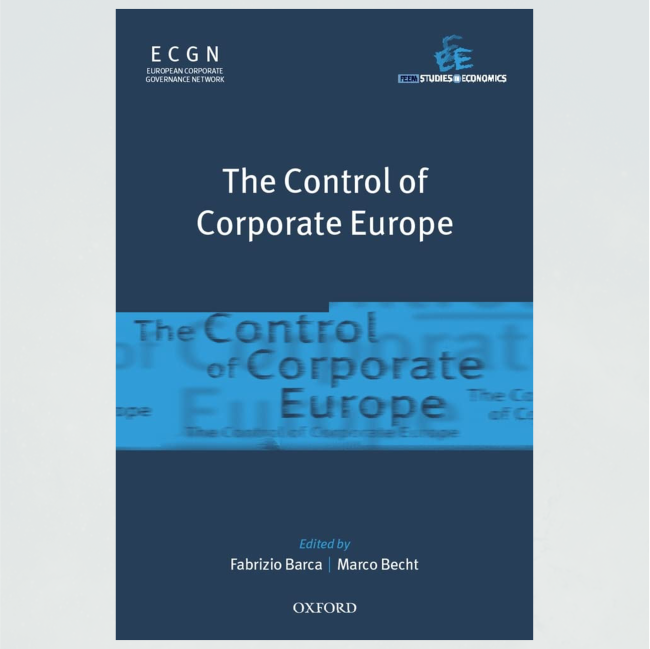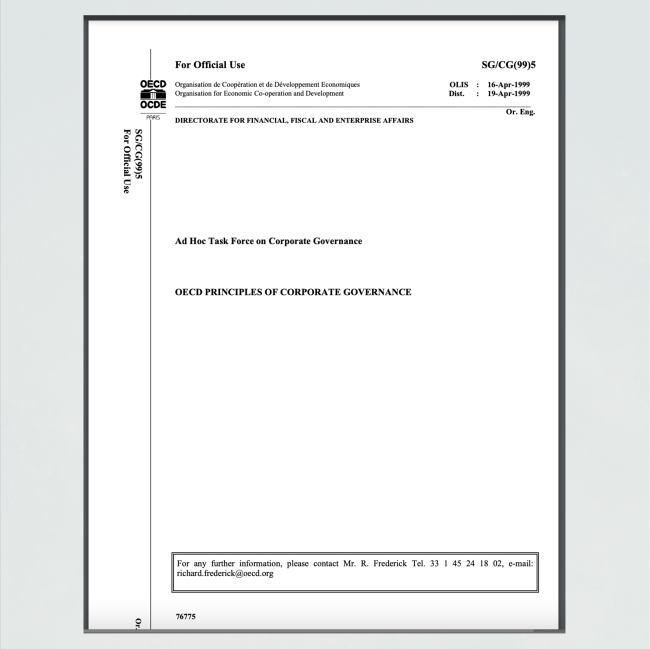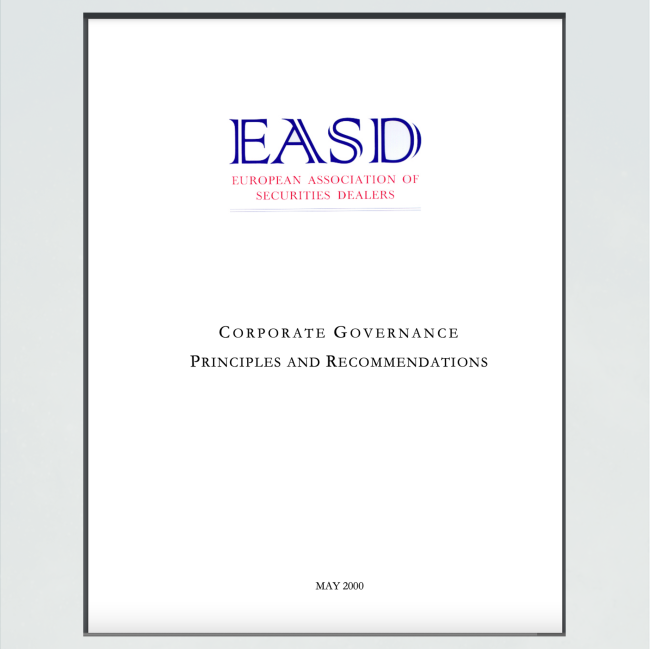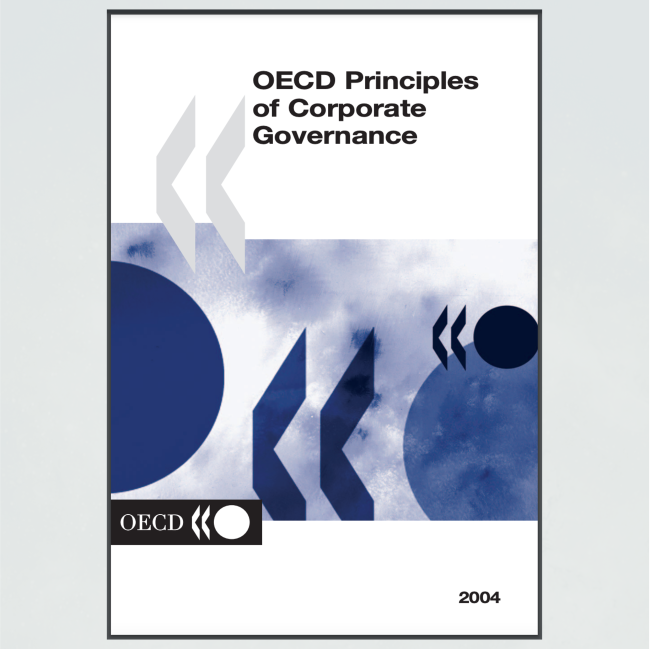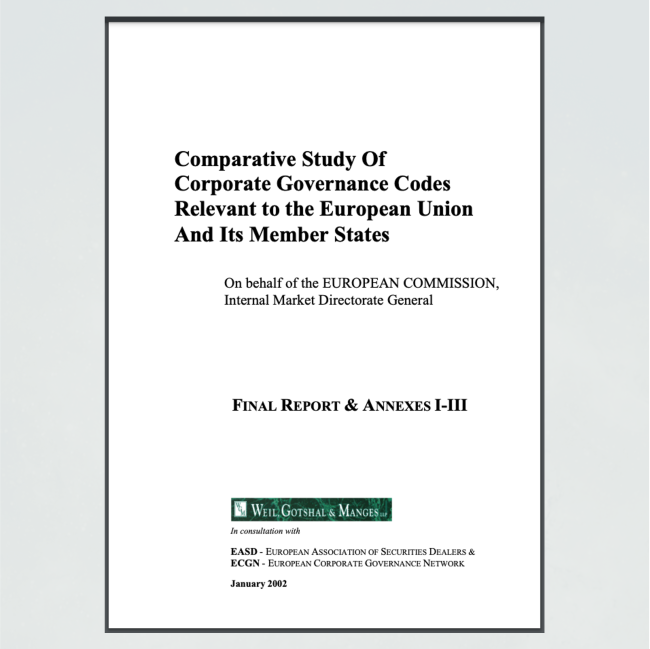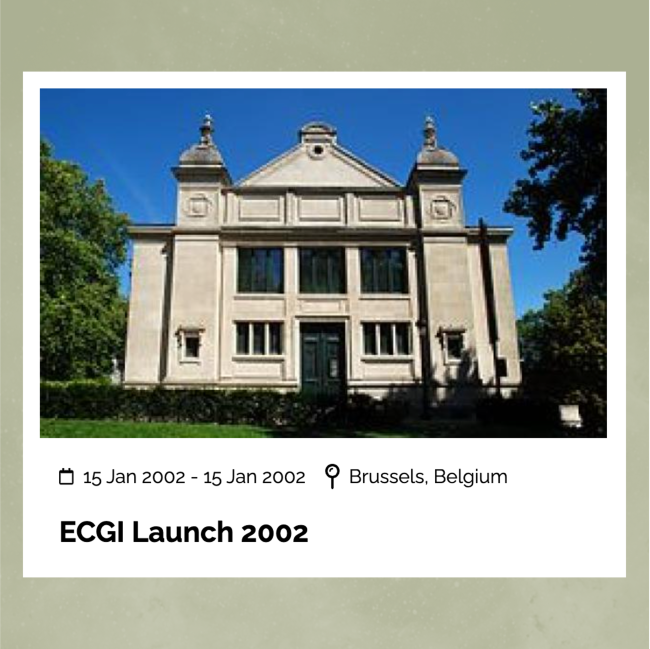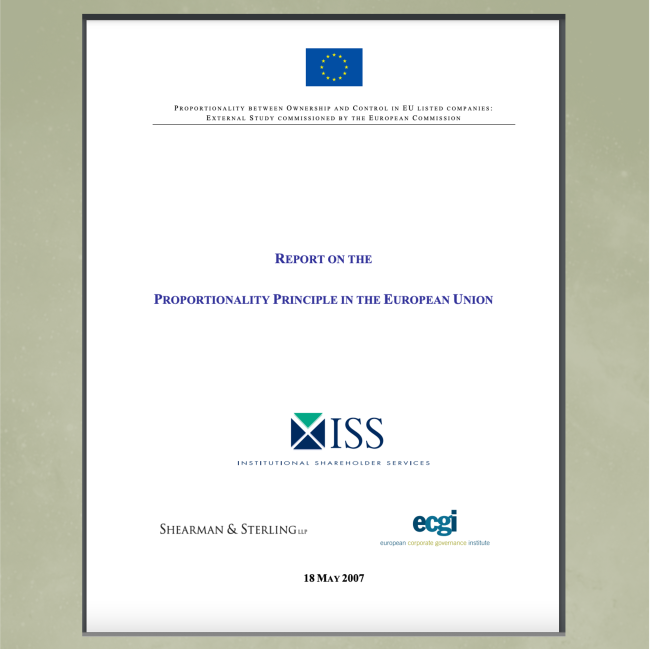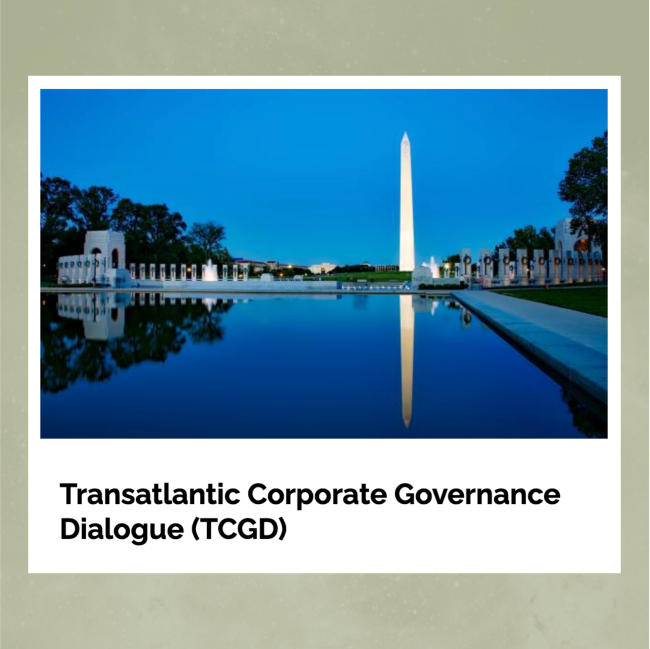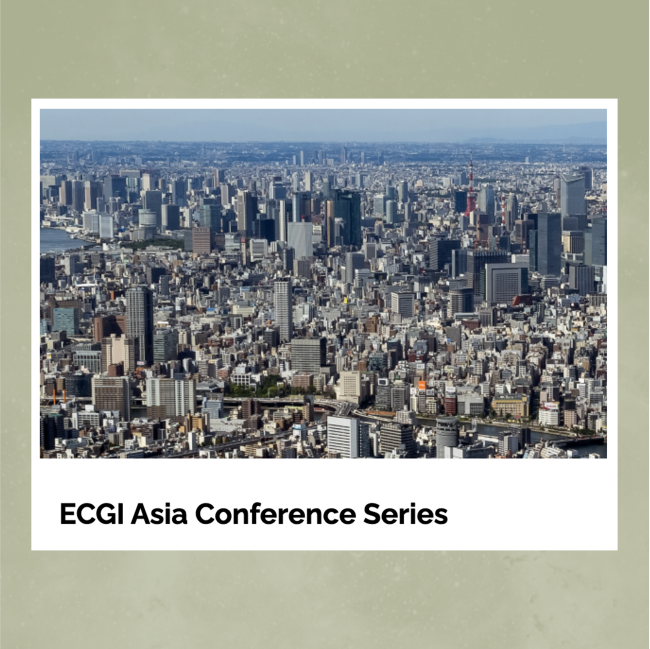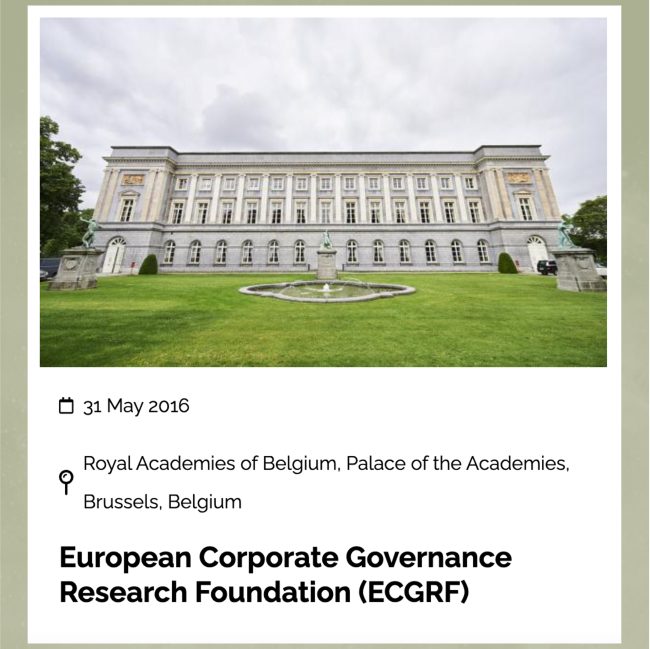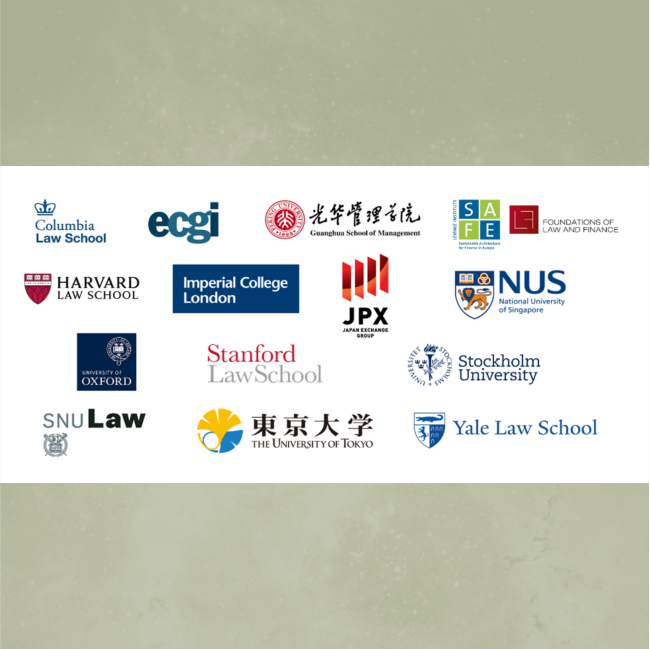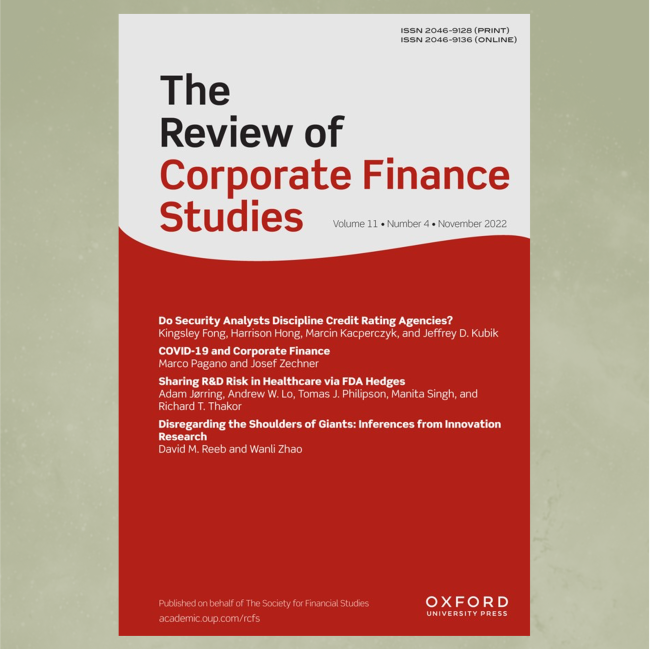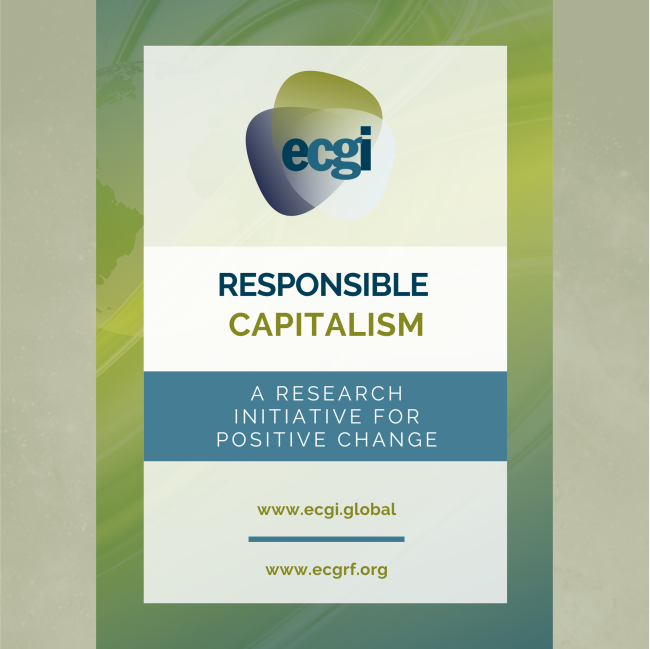History of ECGI
ECGI has evolved as a volunteer collective and community of experts.
ECGI (The European Corporate Governance Institute) was founded in 2002, having been established on 15 October 2001 as an international scientific non-profit association under Belgian law in accordance with its original Articles of Association. It was established to improve corporate governance through fostering independent scientific research and related activities.
Since then, ECGI has published over 1,650 Working Papers on important topics, it has acquired over 900 members from more than 54 different countries, has hosted over 150 international conferences and events, provided training for 18 doctoral students, compiled a directory of over 638 Corporate Governance Codes and counts four Nobel Laureates among its founding members. These achievements were made possible by the loyal support of ECGI research members, institutional partners, patrons and network of academic and practitioner members.
Since its inception, ECGI has been an organisation that functions squarely on the goodwill, enthusiasm and strong collaboration of its members. Our journey is replete with visionary scholars and practitioners, contributing to the building blocks that have shaped and maintained the ECGI for more than twenty years.
Origin Story
The seeds were sown in 1995, when the European Corporate Governance Network (ECGN) was established around a comparative multi-country project that was to study the ownership and control of listed companies in Europe. The study provided detailed information on the voting control of companies listed on the official markets in Austria, Belgium, France, Germany, Italy, the Netherlands, Spain, Sweden, the UK, and as a benchmark comparison, the US.
Two major international, interdisciplinary conferences were funded by Fondazione ENI Enrico Mattei and the European Commission.
The ECGN expanded to Eastern Europe to study corporate ownership, transition and privatisation in accession countries. An international community of scholars started to develop.
In 1995, France became the first continental European country to adopt a corporate governance code; others followed.
In 1999, the OECD published Principles of Corporate Governance. In the same year, a hostile takeover wave swept across Europe.
The 1997 Asian and the 1999 Brazilian financial crises were closely associated with weaknesses in corporate governance. The subject started to receive attention from the IMF, the World Bank and finance ministers.
By 1997, the newly established Corporate Governance Committee of the European Association of Securities Dealers (EASD), a non-profit association with the purpose of “creating favourable conditions for an efficient and competitive pan-European equity market, in the first place for growth companies” had become convinced that good corporate governance is fundamental to the success of any organisation. Its board established a sub-committee on corporate governance, the first task of which was to develop a pan-European corporate governance code that could be adopted by companies from any jurisdiction. Marco Becht was brought in as rapporteur and scientific adviser.
The Code put forward recommendations on auditors and the board, in particular advocating the appointment of non-executive independent directors. Widely held companies in countries like the Netherlands were not exposed to the “market for corporate control”, but had developed forms of control that allowed them to combine blockholder control with stock market liquidity by deviating from “one-share-one-vote” (OSOV).
Because EASD cared about liquidity, it might have been expected that they would refrain from recommending against “control enhancing mechanisms” (as they came to be known), as long as they were properly disclosed. EASD’s committee recommended that “deviations from “one-share-one-vote” should be avoided and, where they exist, must be disclosed”.
In its 1998 Business Sector Advisory Group report, the OECD started to develop its own corporate governance principles on which EASD’s committee was represented. Although reluctant to adopt EASD’s views on directors also independent of blockholders, the OECD agreed to state “The board should be able to exercise objective judgement on corporate affairs independent, in particular, from management”.
When the Principles were revised in the wake of the Russia/Asia/Brazil financial crisis, the 2004 edition of the OECD Principles state more neutrally that “The board should be able to exercise objective independent judgement on corporate affairs”, the explanatory notes stating that “The manner in which board objectivity might be underpinned also depends on the ownership structure of the company.
The next project undertaken by EASD and ECGN was a comparison of corporate governance codes for the European Commission. This time, they teamed up with the New York based law firm Weil, Gotschal & Manges (WGM). Marco Becht had started an online codes collection for ECGN. By then, EASD had established pan-European credentials.
A more permanent footing
The next major turn in affairs came in 2000 when the Leo Goldschmidt Chair for Corporate Governance was established at the Solvay Business School and, through the ECGN connection, Colin Mayer was persuaded to launch the Chair. It was during this visit that the idea to turn ECGN into a more permanent organisation was born. Antonio Borges, then the Dean of INSEAD, was moving to Goldman Sachs in London and agreed to become Chair of the European Corporate Governance Institute (ECGI) which was officially registered in 2002. There were 24 Founding Members.
ECGTN
The European Corporate Governance Training Network (ECGTN) was established in January 2005, in partnership with the Centre for Economic Policy Research (CEPR), to reduce the European research and training gap in corporate governance. The research and the training of the network was organised around the four key themes of Corporate Governance: Shareholders and Takeovers; Boards and Executive Motivation; Debtholders and Multiple Constituencies; and Institutional Aspects, Regulation and Policy.
One-Share-One-Vote
The project often cited as the one with most impact is ECGI’s contribution to the European Commission commissioned study on one-share-one-vote. The study had four well defined parts: An institutional investor survey, some data collection, a legal survey and a survey of the academic literature. ECGI together with Institutional Shareholder Services (ISS) and the law firm Shearman & Sterling, put in a bid. The academic surveys contributed significantly to the European Commission’s decision to refrain from regulatory intervention in the control of listed companies in Europe. The arguments and evidence presented were fully accepted.
Transatlantic Dialogue
ECGI was initially focused on corporate governance in Europe, convening events on comparative systems, takeovers, and remuneration - until it established, together with the the American Law Institute (ALI), the Transatlantic Corporate Governance Dialogue (TCGD) in 2004. TCGD focused on issues at the forefront of policymaking on both sides of the Atlantic. In 2008, Columbia University replaced the ALI as the collaborating partner in the US, and the initiative enjoyed the endorsement and participation of the European Commission for ten conferences, which alternated between Brussels and Washington D.C. until 2014.
By this time, ECGI had appointed 145 additional Research Members, mainly in the US and Europe, since its foundation.
Asia Dialogue
In the light of the success of TCGD, which since 2004 had been a significant forum for engaging in forward-looking discussions on corporate governance issues, the European Commission asked ECGI to explore the possibility of establishing a parallel initiative between Europe and Asia.
A symposium took place in Tokyo in early December 2011 hosted by the University of Tokyo under the auspices of the Japanese Financial Services Agency. The series officially ran until 2017 but ECGI continues to organise events in Asia in partnership with its research members in China, Singapore, Japan, and South Korea.
Strengthening Ties
In 2013, efforts were made to put ECGI on a more permanent basis by raising an endowment through a parallel philanthropic foundation, the European Corporate Governance Research Foundation (ECGRF) the founding patrons of which were Investor AB (Sweden) and BP plc (UK). The Foundation, chaired by Professor E-L von Thadden, Rector of Mannheim University, was officially launched in 2016 at the Palace of the Academies in Belgium with the keynote address delivered by Nobel Laureate and ECGI founding member, Bengt Holmström. Subsequent patrons of ECGRF were BlackRock (2019 - 2023) and AstraZeneca (2021 - present). Of the two original patrons, Investor AB continues to support ECGI activities as a patron and BP plc contributed annual donations until 2018.
In 2014, the Global Corporate Governance Colloquia (GCGC) was established as an interdisciplinary (law, finance, economics and management) conference series, bringing together leading international scholars to debate current ideas in corporate governance research. The series is supported by twelve universities (Harvard, Oxford, Tokyo, Singapore, Frankfurt, Swedish House of Finance, London Business School, Columbia, Yale, Peking, Seoul, Stanford) together with a select group of corporate entities (Japan Exchange Group, JPX and former GCGC partners Zurich AG, the European Investment Bank). The inaugural conference for this series took place at Stanford University in 2015.
A permanent address
By the end of 2015, ECGI had developed a global network and a reputation for excellence. A permanent secretariat was established at the Palace of the Royal Academies in Brussels. Following the successful launch of ECGRF in 2016, ECGI continued to expand its collaborations with its research members, including activities in Israel and Australia. Between 2018 - 2022, an additional 194 research members were appointed in recognition for their work on corporate governance and stewardship. The understanding of corporate governance was expanded to include the rapidly developing field of investor stewardship during this time.
Seismic shift
In 2020, the COVID-19 pandemic forced ECGI activities to move online. Despite the extreme circumstances and challenges, the ECGI network thrived with record numbers of new working papers, events, and subscribers. A project was coordinated on Corporations and COVID-19 to explore the initial effects of the pandemic and the longer-term research questions. Simultaneously, ECGI responded to the European Commission's consultation on Directors’ Duties and Sustainable Corporate Governance which evolved into the Corporate Sustainability Due Diligence Directive (CSDDD).
New Priorities
The trend in papers focused on climate, ESG, purpose, capital markets, ethics and trust, as reflected in broader societal and policy debate continued from 2020 onwards, indicating a transformation in corporate governance. The corporation, how it is financed, its purpose, its governance and its impact on society became subjects that moved centre stage in all regions, commonly referenced using the term ‘ESG’ (Environmental, social and governance). Responding to this, ECGI launched a focus programme on 'Responsible Capitalism' which aims to address and contribute to these developments.
ECGI is a pluralist organisation supporting many views which fuel discussion and debate. It performs a public good by making resources freely available and it fulfils a filter function, making it easier to find high quality research that can been cited with confidence. Supporting this work are many volunteers, sponsors and financial partners.

